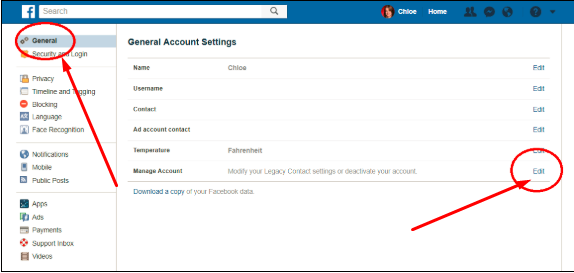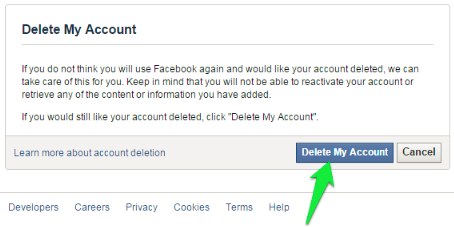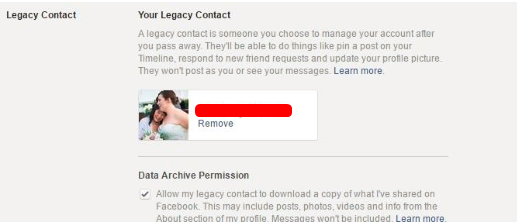Cancel A Facebook Account
By
MUFY UJASH
—
Aug 29, 2018
—
Deleting Facebook Account
Current events could have you pondering a break from Facebook. That's not an option for everyone; because situation, simply tighten up your account settings. Cancel A Facebook Account: But if having your data extracted for political purposes without your authorization illustrations you out, there are ways to separate yourself from the massive social media network.
If you await a social networks break, here's how you can delete Facebook.
Cancel A Facebook Account
Deactivating
Facebook offers you 2 choices: two choices: deactivate or remove
The first couldn't be much easier. On the desktop computer, click the drop-down menu at the top-right of your screen and also choose settings. Click General on the top left, Edit alongside "Manage Account" Scroll down and also you'll see a "Deactivate My Account" link near the bottom. (Right here's the direct link to make use of while logged in.).
If you're on your smart phone, such as making use of Facebook for iOS, in a similar way most likely to settings > Account settings > General > Manage Account > Deactivate.
Facebook doesn't take this gently - it'll do whatever it can to maintain you around, including emotional blackmail regarding how much your friends will certainly miss you.
As such, "Deactivation" is not the same as leaving Facebook. Yes, your timeline will vanish, you won't have accessibility to the website or your account by means of mobile applications, friends can't publish or contact you, and you'll shed access to all those third-party solutions that make use of (or require) Facebook for login. However Facebook does not delete the account. Why? So you could reactivate it later.
Just if anticipated re-activation isn't really in your future, you need to download a copy of all your data on Facebook - posts, photos, videos, chats, and so on-- from the settings menu (under "General"). Exactly what you locate may surprise you, as our Neil Rubenking figured out.
Account Deletion
To totally remove your Facebook account forever and ever, go to the Delete My Account page at https://www.facebook.com/help/delete_account. Simply understand that, per the Facebook data use policy "after you get rid of info from your account or delete your account, copies of that details may stay viewable in other places to the extent it has been shared with others, it was otherwise dispersed pursuant to your privacy settings, or it was duplicated or kept by various other customers.".
Translation: if you created a comment on a buddy's status update or image, it will remain even after you erase your personal account. Several of your posts and photos could hang around for as long as 90 days after deletion, too, however simply on Facebook web servers, not reside on the website.
Removal in support of Others
If you want to alert Facebook concerning a user you understand is under 13, you could report the account, you narc. If Facebook can "sensibly confirm" the account is used by someone underage-- Facebook prohibits kids under 13 to abide by federal legislation-- it will remove the account immediately, without informing anyone.
There's a different type to demand removal of accounts for people who are medically incapacitated as well as therefore incapable to use Facebook. For this to work, the requester must show they are the guardian of the individual in question (such as by power of attorney) as well as offer an official note from a medical professional or medical center that spells out the incapacitation. Redact any type of details necessary to keep some privacy, such as medical account numbers, addresses, and so on.
If a customer has passed away, a heritage contact-- a Facebook close friend or loved one that was designated by the account proprietor prior to they died-- can get access to that individual's timeline, when approved by Facebook. The legacy call may have to offer a link to an obituary or various other paperwork such as a fatality certification. Facebook will certainly "hallow" the page so the departed timeline survives (under control of the heritage call, that can't post as you), or if liked, remove it.
Assign a specific tradition call person to handle your account after your death. You could find that under settings > General > Manage Account > Your Legacy Contact. Once you established one up, you'll get a notification each year from Facebook to check that the contact need to stay the same, unless you pull out of that. You can additionally take the extra action of ensuring that after you die, if the heritage contact does report you to Facebook as dead, your account obtains removed (even if the heritage get in touch with desires the timeline to be hallowed).
If you await a social networks break, here's how you can delete Facebook.
Cancel A Facebook Account
Deactivating
Facebook offers you 2 choices: two choices: deactivate or remove
The first couldn't be much easier. On the desktop computer, click the drop-down menu at the top-right of your screen and also choose settings. Click General on the top left, Edit alongside "Manage Account" Scroll down and also you'll see a "Deactivate My Account" link near the bottom. (Right here's the direct link to make use of while logged in.).
If you're on your smart phone, such as making use of Facebook for iOS, in a similar way most likely to settings > Account settings > General > Manage Account > Deactivate.
Facebook doesn't take this gently - it'll do whatever it can to maintain you around, including emotional blackmail regarding how much your friends will certainly miss you.
As such, "Deactivation" is not the same as leaving Facebook. Yes, your timeline will vanish, you won't have accessibility to the website or your account by means of mobile applications, friends can't publish or contact you, and you'll shed access to all those third-party solutions that make use of (or require) Facebook for login. However Facebook does not delete the account. Why? So you could reactivate it later.
Just if anticipated re-activation isn't really in your future, you need to download a copy of all your data on Facebook - posts, photos, videos, chats, and so on-- from the settings menu (under "General"). Exactly what you locate may surprise you, as our Neil Rubenking figured out.
Account Deletion
To totally remove your Facebook account forever and ever, go to the Delete My Account page at https://www.facebook.com/help/delete_account. Simply understand that, per the Facebook data use policy "after you get rid of info from your account or delete your account, copies of that details may stay viewable in other places to the extent it has been shared with others, it was otherwise dispersed pursuant to your privacy settings, or it was duplicated or kept by various other customers.".
Translation: if you created a comment on a buddy's status update or image, it will remain even after you erase your personal account. Several of your posts and photos could hang around for as long as 90 days after deletion, too, however simply on Facebook web servers, not reside on the website.
Removal in support of Others
If you want to alert Facebook concerning a user you understand is under 13, you could report the account, you narc. If Facebook can "sensibly confirm" the account is used by someone underage-- Facebook prohibits kids under 13 to abide by federal legislation-- it will remove the account immediately, without informing anyone.
There's a different type to demand removal of accounts for people who are medically incapacitated as well as therefore incapable to use Facebook. For this to work, the requester must show they are the guardian of the individual in question (such as by power of attorney) as well as offer an official note from a medical professional or medical center that spells out the incapacitation. Redact any type of details necessary to keep some privacy, such as medical account numbers, addresses, and so on.
If a customer has passed away, a heritage contact-- a Facebook close friend or loved one that was designated by the account proprietor prior to they died-- can get access to that individual's timeline, when approved by Facebook. The legacy call may have to offer a link to an obituary or various other paperwork such as a fatality certification. Facebook will certainly "hallow" the page so the departed timeline survives (under control of the heritage call, that can't post as you), or if liked, remove it.
Assign a specific tradition call person to handle your account after your death. You could find that under settings > General > Manage Account > Your Legacy Contact. Once you established one up, you'll get a notification each year from Facebook to check that the contact need to stay the same, unless you pull out of that. You can additionally take the extra action of ensuring that after you die, if the heritage contact does report you to Facebook as dead, your account obtains removed (even if the heritage get in touch with desires the timeline to be hallowed).








